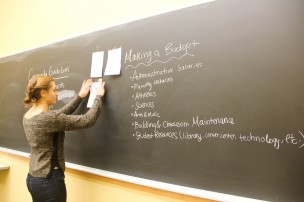On Wednesday, Oct. 9, students and administrators participated in a workshop titled “Does Money Buy Education?” The event, led by Wesleyan Diversity Education Facilitators (WesDEF) Julie Hsia ’14 and Micaela Kaye ’16, focused on the role a student’s socioeconomic background has on hir education, both in high school and in college.
“[We] thought it would be interesting to see how money is involved in the college admissions process, how it is distributed in high schools, and how that creates advantages and disadvantages,” Kaye said. “We also wanted to know how much your socioeconomic background plays a role in the education you receive.”
Hsia and Kaye started the workshop by having attendees create a mock high school budget. Students had to allocate funds between faculty salaries, administrative salaries, science, athletics, music and arts, student resources, and building management. After each group shared its budget with the others, the leaders showed a budget used by New York City public schools in 2006.
The contrast between budgets perturbed Eric Zepeda ’17, who attended the workshop.
“I was surprised to learn how little money is actually allocated to student resources,” Zepeda said. “Without providing students with such basic resources as transportation, it becomes clear why many students fall behind in their studies.”
During the next activity, students were given cards assigning them new identities with new social and economic backgrounds, races, classes, sexual orientations, and parents’ education levels.
Students were then told to take a step forward for each characteristic deemed favorable by society, such as being able to afford an SAT prep class, and a step backward for those that society considers unfavorable, such as needing to work instead of being able to afford the same prep course. As the students were dispersed by their progressions or regressions, sections were ultimately separated and given acceptance to Wesleyan, a state university, community college, or no university at all.
Abel Sandoval ’15 approved of the activity.
“I really liked the simulation,” Sandoval said. “It really put into perspective the advantage income has on education. I think the first step in addressing a problem is to…discuss it. Some topics, like class, seem taboo on campus, so it’s important to improve understanding.”
The role of money in education is important, specifically in the context of the University.
“People have begun to scratch the surface with the financial aid debate,” Hsia said. “Hopefully we can go deeper in this workshop.”
Hsia was referring to the University’s transition last year to a financial aid plan that would admit roughly 90 percent of the freshman class on a need-blind basis and 10 percent on a need-aware basis.
“Our education is flawed, as it allows unequal access to education,” Kaye said. “This debate is relevant at the University as well. Financial aid doesn’t cover everything here, so there are differences, be it subtle, between classes.”
Director of Financial Aid John Gudvangen and Dean for Diversity and Student Engagement Renee Johnson-Thornton also participated in the workshop. Johnson-Thornton said that she was attracted to the workshop for both professional and personal reasons.
“I identify as a first-generation college student from a low-income family, so of course I was interested in the topic,” Johnson-Thornton said. “But in a professional sense, I’m constantly talking to students about how money is a barrier at Wesleyan. Students shouldn’t be encountering barriers here.”
Johnson-Thornton noted that she values the efforts of groups like WesDEF to raise awareness and create spaces for discussion on these topics.
“I appreciate the call for students to start organizations around this issue,” Johnson-Thornton said. “A few years ago, a student group formed around first-generation college students, but it fizzled out after a couple years.”
She added that the dialogue was so thought-provoking that the workshop’s end felt abrupt.
“For a minute, I couldn’t believe it was over,” she said. “The issue of school options based on class is such an important issue; there’s a lot to talk about. Nonetheless, it was a powerful experience.”
Kaye hopes that the workshop will spark future discussion and organizational effort surrounding the issue.
“This group is dedicated to creating open dialogue and space on campus to talk about social justice issues,” Kaye said. “If people want to do something after this, it’s important for us to know how we can supplement this course of action and act as a support system.”

Comments are closed